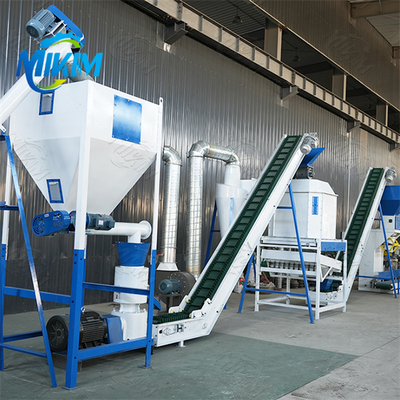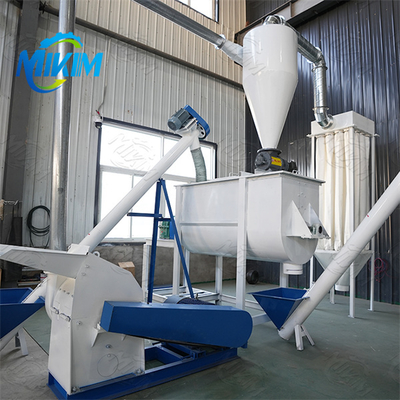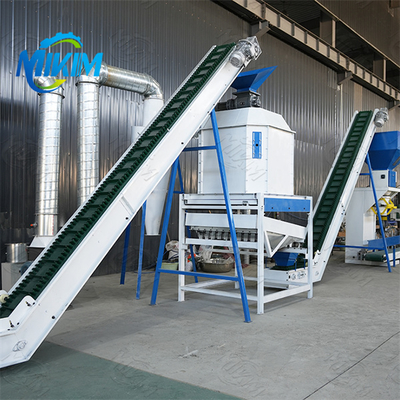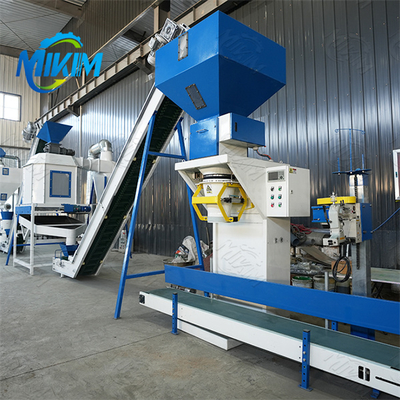Duck Feed Pellet Production Line
A feed pellet production line is a complete system of machines used to process raw ingredients into finished, high-quality, and nutrient-dense pellets for livestock, poultry, and aquatic animals. The specific equipment and process can vary based on the desired output, capacity, and animal type.
1. Raw material crushing and preparation
This initial step involves processing ingredients such as corn, wheat, soybean meal, and other grains.
Process: A feed hammer mill grinds the raw materials into a uniform powder, which ensures a consistent and high-quality final product.
2. Mixing
The ground ingredients are blended with other components to create a balanced feed formula.
Process: A feed mixer combines the crushed grains with nutritional additives like vitamins, minerals, and supplements.
3. Pelletizing
This is the core stage where the mixed feed is transformed into pellets.
Process: The mixed material is fed into a pellet mill (either a flat die or ring die type). The mill uses pressure and heat to compress the ingredients into dense, cylindrical pellets of a uniform size. Ring die pellet mills are more common for larger, commercial-scale production, while flat die mills are typically used for smaller operations.
4. Cooling
Freshly made pellets are hot and soft, so they must be cooled to ensure their stability and quality.
Process: The hot pellets are transferred to a pellet cooler, which uses a fan to reduce their temperature and moisture content.

| Specification |
Details |
| Capacity |
1-100t/h |
| Range of application |
Large commercial feed factory, could make chicken, sheep, cow, shrimp feed |
| Workers requirements |
4-5 people |
| Shipment requirements |
6×40ft container |
| Product advantages |
Fully automatic intelligent batching, computer control system with stable output, efficient and continuous operation, labor saving, direct packaging, particle size can be selected from 1-12mm. |
| Size for whole line |
According to land size and layout |
Key Components
Hoist
The spiral elevator can transport feed pellets. It is clean, sanitary, easy to operate, strong and reliable.
Mixer
The mixer is mainly used to mix feed raw materials, highly mixed without residue, mixed evenly, can help to make more nutritious feed pellets.
Granulator
The pellet feed processed by the feed pellet machine has a higher density and hardness, which can avoid feed deterioration and mold caused by improper feeding, thus ensuring the quality of feed.
Cooler
Counterflow coolers are mainly used for feed cooling production lines with large feeds. The material is cooled in layers from bottom to top by the inhaled air. The air intake area is large, the cooling effect is good and the effect is significant.
Crusher
Used to crush feed particles. Compact structure, uniform crushing, low noise, reliable operation, more uniform particle size of finished products, high efficiency.
Bucket Elevator
Used for transportation of various raw materials and large production lines, with high strength, easy maintenance and good sealing performance.
Packer
The device mainly consists of three parts: automatic weighing and packaging machine, conveying device and sewing device. It is mainly suitable for quantitative packaging of granular and granular powder mixed materials.
Air Blower
The air conveyor can transport the finished pellets to the dryer in an enclosed and pollution-free environment, making the pellets safer.



Supplier Reliability
When choosing feed processing line equipment, you need to pay attention to the quality of the equipment and after-sales service.
Whether it's a new construction or expansion project, or the upgrading of existing facilities, MIKIM can use its rich processing expertise to meet your specific requirements at the lowest total cost of ownership.
We customize solutions according to your feed type, raw materials, formulation, plant area, production capacity, etc. No matter how special your raw materials are or how limited your plant space is, our engineers can design the most suitable solution for your feed processing needs.

Certification

 Your message must be between 20-3,000 characters!
Your message must be between 20-3,000 characters! Please check your E-mail!
Please check your E-mail!  Your message must be between 20-3,000 characters!
Your message must be between 20-3,000 characters! Please check your E-mail!
Please check your E-mail! 




